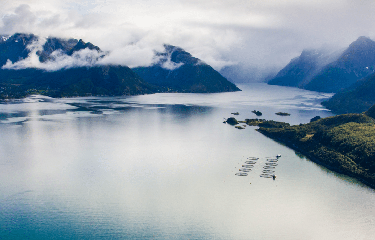Norwegian salmon-farming firms are rethinking planned investments following the introduction of a proposal by Norway’s government that would increase the tax rate they face by 40 percent.
On 28 September, the government of Norway proposed a new resource rent tax on aquaculture operators, with effect from 1 January, 2023, which will affect producers of salmon, trout, and rainbow trout.
Kverva, Norway-based SalMar and Lovund, Norway-based Nova Sea have already announced pullbacks from planned infrastructure upgrades, and Mowi, Lerøy Seafood, and Grieg Seafood are among companies that have released statements announcing a review of how the proposed tax could affect their operations and future investments.
SalMar “has chosen to use the opportunity to terminate the purchase” of 1,223 metric tons of maximum-allowed biomass it made earlier in 2022 as part of a relative share capacity adjustment available through Norway’s “traffic-light” permitting system. The price of the acquisitions was NOK 244.6 million (USD 22.5 million, EUR 23.1 million).
“This is due to the resource rent tax the government has now announced. The proposals involve, among other things, that the state acquires 40 percent of all cash flows in the company, and that the other owners' share is correspondingly reduced. This is expressed by the total tax for aquaculture companies in Norway increasing from 22 to 62 percent. If the proposals were to be adopted, there would be major consequences for the company's investment decisions and capital allocation going forward,” the company said in a statement on Friday, 30 September. “This has created a situation which means that the company does not find it justifiable to pay the aforementioned remuneration. The government's surprising proposal, without waiting for the recommendation from the government-appointed tax committee, has also led to an unpredictability on the part of the authorities, which reinforces the need for a closer evaluation of the company's future investment strategies.”
SalMar CEO Linda L. Aase warned the tax, if enacted, will have a crippling impact on Norway’s salmon-farming industry.
“This is a tax on aquaculture companies creating value and workplaces on the coast of Norway,” Aase said. “A tax like this will have significant negative ripple effects for all adjacent industries of the aquaculture industry and the jobs it creates. SalMar will revert with additional information on the consequences of such taxation for our group operations once further details of the new tax have been clarified.”
Similarly, Nova Sea – which counts Mowi as a minority owner – has put its previously announced plan to build a new hatchery and slaughterhouse on hold following the introduction of the tax proposal. Announced in April 2021, the project had an estimated cost of between NOK 800 million and NOK 1 billion (USD 73.8 million and USD 92.2 million, EUR 75.5 million and EUR 94.4 million).
“The way the proposal from the Ministry of Finance is designed, our financial leeway created from marine production will be taxed at 62 percent. This in turn will significantly weaken our ability to handle new investments. In particular, this will affect investments on land, as tax deductions will only apply to investments in marine production itself. It is not in marine production that we have the biggest investments going forward,” Nova Sea CEO Tom Eirik Aasjord said in a statement. “Our framework conditions for creating growth and new jobs out in the rural areas were completely turned upside down within minutes.”
Nova Sea Chairman Aino Olaisen said the tax, combined with a steep increase in business costs, threatens the stability of the industry.
“Over the past two years, the farming industry has had an explosive increase in its production costs. Our customers in Europe, and in the rest of the world, are in the middle of an extreme situation with high inflation, where future purchasing power is threatened. In parallel with this, the Ministry of Finance is introducing a production tax from 2021, making major tightening of wealth taxation and introducing a basic rate of 40 percent, which gives a marginal tax of 62 percent,” Olaisen said. “The sum of all this results in an uncertainty that is too great for Nova Sea to proceed with the growth plans for the group as the situation currently stands.”
Olaisen said a compromise must be found between the country's need for income and the business community's need for stability and its goal of supporting local economies in rural areas.
"Nova Sea has a great understanding that Norway needs greater income, as the world and Norway are in a demanding situation. We are among Nordland's largest taxpayers today, and also understand that we must pay more in tax for the use of land and sea," Olaisen said. "However, what is particularly important to us is that the structure of taxation does not put jobs and local communities at risk. We also fear that this change in framework conditions will weaken the Norwegian aquaculture industry's competitiveness in the markets in which we operate."
Lerøy Seafood, Grieg Seafood, and Mowi each issued statements condemning the tax proposal. Lerøy called the plan "undoubtedly hostile to the industry" and Grieg said it had paused all new investments until it has a clearer picture of its future financial picture.
“The Norwegian government proposes to introduce a resource tax in the amount of 40 percent on salmon farmed in Norwegian ocean territory for volume above 4,000 to 5,000 tonnes with effect from the tax year 2023,” Grieg said in a release. “The proposal does not yet contain all details and is still subject to a public hearing as well as approval by the Norwegian Parliament. Grieg Seafood will assess how the proposal will impact the group's business and strategy, should it be adopted in the current form. While this assessment is conducted, the group has put new investments on hold.”
Photo courtesy of Nova Sea







